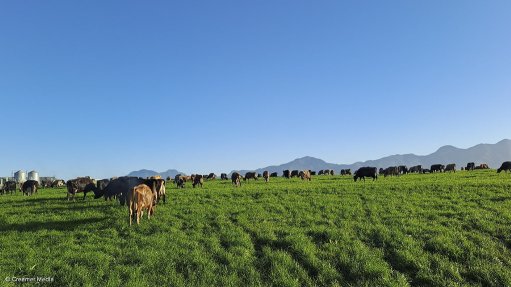Human rights body sets outs legal remedies to tackle water mafia plague
The South African Human Rights Commission (SAHRC) has published a comprehensive policy brief highlighting the various legislative and policy mechanisms available for the State to tackle so-called ‘water mafias’ and the systematic sabotage of essential water infrastructure.
The policy brief, titled ‘How to address systemic sabotage of essential water infrastructure’, seeks to be a clarion call to South Africa’s law enforcement agencies and other State role-players, making several advisory recommendations to address the crisis.
“The SAHRC has noted with concern the prevalence of systemic sabotage of essential water infrastructure associated with the emergence of water mafias in South Africa,” the commission said, noting that this had become a scourge posing a significant danger and hampering the State’s efforts to achieve access to water for all.
The water service authorities’ inability to provide an adequate water supply has led to the emergence of organised syndicates deliberately sabotaging water infrastructure, particularly at a municipal level, with the sole objective of profit-making.
The nature and extent of water-related crime varies from severe vandalism, corruption and procurement irregularities, to violent attacks on municipal officials. In some instances, municipal officials are held hostage and tortured, while others are murdered, the policy document highlighted.
“To combat these offences, it is essential to raise the profile of these offences; to mobilise more resources to combat them; increase public awareness by improving their visibility; and use convictions as a deterrent to future crimes.”
Given the serious impact of attacks on water services infrastructure and the rising violence against local government officials, it is in the public interest to classify these activities as national priority offences.
The policy brief, which was published with the expert assistance of the Dullah Omar Institute at the University of the Western Cape, urged Cabinet member responsible for policing to include water services infrastructure in its policing priorities and finalise and adopt the Draft National Policing Policy that was developed in 2023.
Further, the Office of the President needs to proclaim and promulgate the remainder of the Critical Infrastructure Protection Act, No. 8 of 2019, following which, once it becomes operational, the Minister responsible for the administration of the Act should declare all water services infrastructure as critical infrastructure.
The policy brief further recommended that the deliberate sabotage of water services infrastructure be considered as constituting a crime in terms of section 3(1) of the Criminal Matters Amendment Act, No. 18 of 2015.
“The deliberate sabotage of water-related infrastructure to the extent where it is deliberately accompanied with an intent to instil fear, public panic or overthrow the current order while causing serious water disruption should be considered as constituting a terrorist activity in terms of the Protection of Constitutional Democracy against Terrorist and Related Activities Amendment Act, No. 23 of 2022.”
Among the recommendations is that the South African Police Service (Saps) deploy sufficient resources to help water services authorities safeguard and protect water services infrastructure.
In addition, the Directorate for Priority Crime Investigation should accept that activities targeting water services infrastructure are a national priority crime; take immediate steps to investigate allegations of activities targeting water services infrastructure; make activities targeting water services infrastructure a priority to the extent that it may enjoy preference when resources to carry out effective investigations are limited; and create a dedicated reporting channel where water services authorities may report or provide information about suspicious activities involving water services infrastructure.
The report also noted that the National Prosecuting Authority needs to take the necessary internal steps that will make the prosecution of activities targeting water infrastructure a priority by collaborating with other key stakeholders such as the Hawks, the criminal intelligence division of the Saps and water services authorities, as well as mobilising an adequate number of trained and experienced prosecutors, besides others.
The commission has shared the policy brief with the Presidency; the Minister of Police; the Minister of Water and Sanitation; the National Director of Public Prosecutions; and the Office of the Chief Justice for them to take note of the advisory recommendations contained in the policy brief.
“The SAHRC urges government not to dither in tackling and addressing the systemic sabotage of essential water infrastructure. The SAHRC cautions that if left unchecked, the systemic sabotage of essential water infrastructure poses a threat to a water secure South Africa.”
Article Enquiry
Email Article
Save Article
Feedback
To advertise email advertising@creamermedia.co.za or click here
Press Office
Announcements
What's On
Subscribe to improve your user experience...
Option 1 (equivalent of R125 a month):
Receive a weekly copy of Creamer Media's Engineering News & Mining Weekly magazine
(print copy for those in South Africa and e-magazine for those outside of South Africa)
Receive daily email newsletters
Access to full search results
Access archive of magazine back copies
Access to Projects in Progress
Access to ONE Research Report of your choice in PDF format
Option 2 (equivalent of R375 a month):
All benefits from Option 1
PLUS
Access to Creamer Media's Research Channel Africa for ALL Research Reports, in PDF format, on various industrial and mining sectors
including Electricity; Water; Energy Transition; Hydrogen; Roads, Rail and Ports; Coal; Gold; Platinum; Battery Metals; etc.
Already a subscriber?
Forgotten your password?
Receive weekly copy of Creamer Media's Engineering News & Mining Weekly magazine (print copy for those in South Africa and e-magazine for those outside of South Africa)
➕
Recieve daily email newsletters
➕
Access to full search results
➕
Access archive of magazine back copies
➕
Access to Projects in Progress
➕
Access to ONE Research Report of your choice in PDF format
RESEARCH CHANNEL AFRICA
R4500 (equivalent of R375 a month)
SUBSCRIBEAll benefits from Option 1
➕
Access to Creamer Media's Research Channel Africa for ALL Research Reports on various industrial and mining sectors, in PDF format, including on:
Electricity
➕
Water
➕
Energy Transition
➕
Hydrogen
➕
Roads, Rail and Ports
➕
Coal
➕
Gold
➕
Platinum
➕
Battery Metals
➕
etc.
Receive all benefits from Option 1 or Option 2 delivered to numerous people at your company
➕
Multiple User names and Passwords for simultaneous log-ins
➕
Intranet integration access to all in your organisation


















